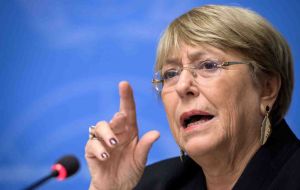MercoPress. South Atlantic News Agency
UN human rights office calls for moratorium in use of facial recognition technology
 The report was requested by the United Nations Human Rights Council two years ago, but it comes as demonstrations have erupted in a number of countries.
The report was requested by the United Nations Human Rights Council two years ago, but it comes as demonstrations have erupted in a number of countries.  Michelle Bachelet's appeal came as her office published a report about the impact of new technologies on the promotion and protection of human rights
Michelle Bachelet's appeal came as her office published a report about the impact of new technologies on the promotion and protection of human rights The UN human rights chief called on Thursday for a “moratorium” on the use of facial recognition technology during peaceful protests, stressing that it could increase discrimination against people of African descent and other minorities.
Michelle Bachelet's appeal came as her office published a report about the impact of new technologies on the promotion and protection of human rights in the context of assemblies, including peaceful protests.
“There should be a moratorium on the use of facial recognition technology in the context of peaceful protests, until states meet certain conditions including human rights due diligence before deploying it,” Bachelet said in a statement.
The report was requested by the United Nations Human Rights Council two years ago, but it comes as demonstrations have erupted in a number of countries.
“New technologies can be used to mobilize and organize peaceful protests, form networks and coalitions, and help people to be better informed about demonstrations and the reasons they are happening, thus driving social change,” Bachelet said.
But, she stressed, “as we have seen, they can be - and are being - used to restrict and infringe on protesters' rights, to surveil and track them, and invade their privacy.”
The UN report pointed out that technology-enabled surveillance had been a major factor in shrinking civic space in a range of countries, with some states using intrusive online surveillance and the hacking of social media accounts used by protest organizers and demonstrators themselves.




Top Comments
Disclaimer & comment rulesCommenting for this story is now closed.
If you have a Facebook account, become a fan and comment on our Facebook Page!